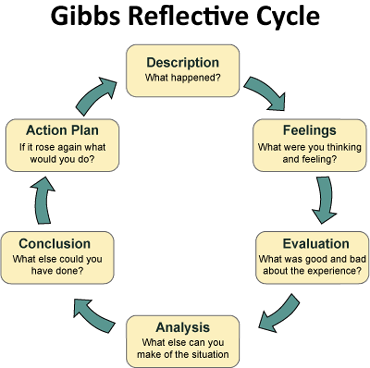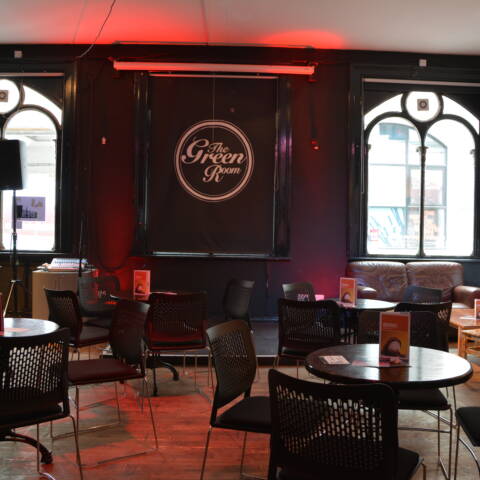“Writing also requires that we find our own voice. Your reflective piece is yours and it shows your unique voice. You will not write the wrong thing because whatever you write will be right for you.”1
(Dundalk Institute of Technology, 2023)
Introduction:
As I encroached upon the end of the second year of my degree, my focus was suddenly drawn towards the dreaded question, “So, what comes after this?, mainly due to the fact that it seemed to be the only question I was asked by many of my relatives. So when it came round to choosing my subjects for the following year I very gladly chose the placement module to give myself the extra security of ‘experience’ for when I eventually start my career. In this blog I will recount the first few months of my placement at ‘The Black Box, Belfast,’ (Up until November 14th, 2023), using Graham Gibbs’ model on the reflective cycle as a means of critically engaging in my experience. With additional references to the writings of Melenie Jasper and other academics.

“Gibbs’ framework has achieved the status of a seminal theory in reflective practice in healthcare and it would be difficult to find any paper or textbook on reflective practice in the last 15 years that did not draw on his work in some way.”2
(Jasper, 2013)
Gibbs’ Model of the reflective cycle refers to the stages of evaluation that encompass reflective practice. Jasper cites this model as, ‘a seminal theory in reflective practice in healthcare,’ however I will be using it in the context of academia as I believe that it applies, due to its broadness in approach.
The Application Process:
When I finally got round to reaching out to different organisations in regards to my placement it was around the beginning of July and I was worried about whether or not I had started too late. I sent out a variety of emails to different businesses and hoped for the best. Thankfully Black Box got back to me relatively quick and I was able to speak to Deirdre McKenna who is on their outreach team. Due to their fast response we had plenty of time to discuss what I would be doing for them throughout the summer. However I could have saved myself the stress if I had started contacting people earlier, so in the future I will be sure to give myself plenty of time to plan for a deadline, especially if I am relying on the involvement of other people.

“We learn by doing and realising what came of what we did.”3
(Dewey, 1938)
Jasper cites John Dewey; a philosopher in education, within their writing on reflective practice. With regard to the quote above she writes, “A fundamental concept is the idea that we need to find ways of ‘recognising’ the causes and effects of our actions and acknowledging our own part in them.”4 (Jasper, 2006) Dewey was a pragmatist, he believed that ‘things that work in a practical situation are true, while those that do not are false’.5 (Nickerson, 2023) While this view is much too limiting within the context of reflective practice, Jasper’s choice to pay homage towards it in her writing shows an importance towards reflecting upon practical work and learning through mistakes and successes. Therefore it is through the analysis of my failings that allows me to learn from them and improve in the future.
My First Day at the Job:
Over the summer leading up to my final year my main mode of communication with Black Box was via Deirdre over email, although I did come up to Belfast a few times to meet in person. Through discussion about my placement it was decided that I would be working primarily at the Black Box’s social café, a weekly event made by and for adults who identify as having a learning disability or autism, which Deirdre ran. This work will eventually culminate in the production of two short films to advertise the event. At this time this felt like a very daunting task, I was primarily concerned with how I would represent a marginalised community in a way that was sensitive and honest. I brought this up with Deirdre and was reassured that I would be supported by them throughout which did calm my nerves a little bit, however, especially given that I hadn’t even started working there yet I still felt quite nervous about the process. “To be reflexive is to examine, for example, the limits of our knowledge, of how our own behaviour plays into organisational structures counter to our own personal and professional values, and why such practices might marginalise groups or exclude individuals.”6 (Bolton, 2014) In this quote Bolton examines how trying to go into something with a narrow mind can limit us in the learning process and can hurt the people we work with. Given this, I decided to go into my role without any preconceptions of what I would have to do. I acknowledged that my experience was limited and went in with the desire to learn. This immediately took a lot of the pressure off and I felt much more confident in my ability to do the job.

Not a lot was expected of me on my first shift at the social café. I was meant to come and sit down with everybody so that I could start to get to know the regulars. My anxieties around my role quickly faded away as it became evident that everyone there was very interested in talking to me about the short films I would be making for them. One of my first interactions was with a man who was partially deaf. At first communication was challenging as I didn’t know any sign language, however he could read lips and he quickly told me that it helps him when people are very expressive which I took on board immediately. This interaction gave me a huge amount of optimism towards the future of my placement as I had shown myself, as well as the people who I was working for that I am capable in the role that I was given. In the future however, It would be good if I learnt a little bit of sign language so that I would have more of a jumping off point when communicating with people who use it.
The Cycle of Reflection:
One challenge that comes with my placement is that the Black Box is on the other side of the city to both where I live and to Queen’s. This wouldn’t be as much of a problem as I am quite familiar with the bus routes in Belfast, however, the social café happens to take place immediately after one of my classes. This immediately meant that I was unable to arrive at my placement on time. Luckily Deirdre was understanding towards this and I was able to get in a routine of arriving within half an hour of my class ending by taking the bus. However, this still added a level of stress to the experience. Upon reflection I should have taken this into account when I was planning my placement schedule at the start of the year. Given that the social cafe was a fixed time this may not have changed much, however I could have negotiated with them to have my shift start an hour later. In future these considerations will be much higher in my list of priorities to minimise as much stress as possible.
“The cyclical nature of reflective practice is the key to move forward as practitioners, in that we rarely stop at just the one cycle. If we complete the first cycle, i.e. we consciously take action as a result of the reflective processes we have undertaken, then the next time we have that experience, or one similar to it, we will encounter it in a different way. Thus, the experience itself has been transformed.”7
(Jasper, 2003)
As Jasper states in the above quotation, reflection doesn’t stop at, ‘just the one cycle,’ it is a constant process of continued self-awareness. This was not be the last challenge I faced in regards to my placement, however because I continued to practice the cycle of reflection presented in Gibbs’ model I continued to learn from my mistakes so I can now minimise them for the future.
Conclusion:
Overall I have been enjoying my placement. I have had many opportunities to learn throughout and on reflection the choice to do something that I initially had felt uncomfortable about was a good one as I feel that I have been able to grow because of it. I am now starting work with my placement that is a lot more hands-on, which I feel both excited and nervous about. However, I have learned from my work at the Black Box to not let my nerves get in the way of learning, but to instead deal with them head-on. “As we practice reflection we often develop the capacity to see ourselves in the act or moment, to become aware of our actions in a given situation.”8 (Dundalk Instittute of Technology, 2023) This quote from the Dundalk Institution of Technology resonates with me in regards to my experience as through my work I have become more comfortable with my awareness of myself and how I come across. I feel that by practicing reflection I have become better at problem solving, planning and my people skills have greatly improved.
Bibliography:
- Bolton, G. (2014) Reflective Practice: Writing and Professional Development. 4th edn. London: Sage.
- Dundalk Institute of Technology (2023) Reflective Practice: Reflection. Available at: https://dkit.ie.libguides.com/reflective_practice/Reflection (Accessed 15th November 2023).
- Dundalk Institute of Technology (2023) Reflective Practice: Reflective Writing. Available at: https://dkit.ie.libguides.com/reflective_practice/reflective_writing (Accessed 15th November 2023).
- Gibbs, G. (1988) Learning by Doing: A Guide to Teaching and Learning Methods. Oxford: Oxford Further Education Unit.
- Jasper, M. (2003) Foundations in Nursing and Healthcare. Cheltenham: Nelson Thornes.
- Jasper, M. (2006) Reflection, Decision-Making and Professional Development. Oxford: Blackwell Publishing.
- Jasper, M. (2013) Beginning Reflective Practice. Andover: Cenage Learning EMEA.
- Nickerson, C. (2023) John Dewey on Education, Impact and Theory. Available at: https://www.simplypsychology.org/john-dewey.html (Accessed 17th November 2023).
References:
- Dundalk Institute of Technology (2023) Reflective Practice: Reflective Writing. Available at: https://dkit.ie.libguides.com/reflective_practice/reflective_writing (Accessed 15th November 2023).
- Jasper, M. (2013) Beginning Reflective Practice. Andover: Cenage Learning EMEA. pp. 80.
- Dewey, J. (1938) Experience in Education. New York: Macmillan, cited in Jasper, M. (2006) Reflection, Decision-Making and Professional Development. Oxford: Blackwell Publishing. pp. 41.
- Jasper, M. (2006) Reflection, Decision-Making and Professional Development. Oxford: Blackwell Publishing. pp. 41.
- Nickerson, C. (2023) John Dewey on Education, Impact and Theory. Available at: https://www.simplypsychology.org/john-dewey.html (Accessed 17th November 2023).
- Bolton, G. (2014) Reflective Practice: Writing and Professional Development. 4th edn. London: Sage. pp. 7.
- Jasper, M. (2003) Foundations in Nursing and Healthcare. Cheltenham: Nelson Thornes, pp. 3.
- Dundalk Institute of Technology (2023) Reflective Practice: Reflection. Available at: https://dkit.ie.libguides.com/reflective_practice/Reflection (Accessed 15th November 2023).